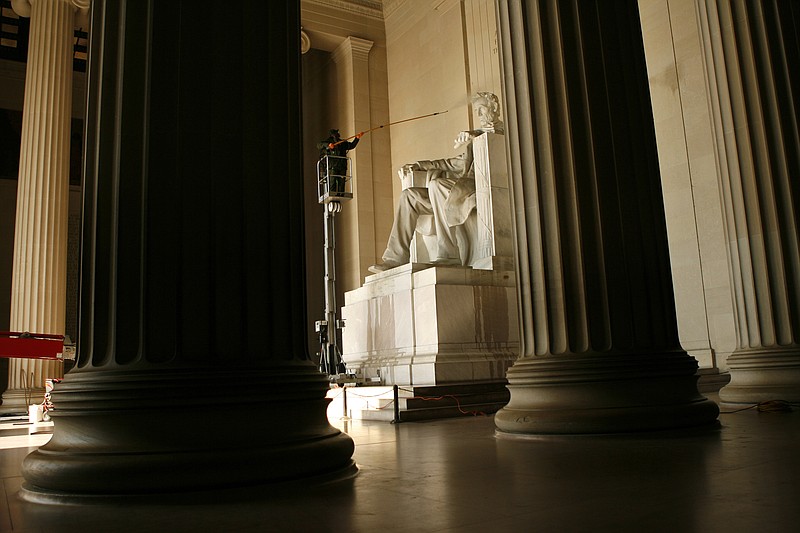In a day when statues and monuments are toppled with all the thought of batting away a mosquito, a former University of Chattanooga official says even the president of the United States with the most credentials among black and white America should be suspect.
Dr. Thomas J. DiLorenzo argues in his new book "The Problem With Lincoln" that the 16th president plunged the nation into an unnecessary war, violated the rights of Americans in the North and South, overturned the original constitutional order and massively inflated the federal government.
Lincoln's actions, he claims, were not to free slaves, but were carried out for personal ambition, an appetite for power and a desire to support the interests that helped bankroll his career.
DiLorenzo, professor of economics at Loyola University Maryland, a member of the senior faculty of the Ludwig von Mises Institute and a research fellow at The Independent Institute, was the Scott L. Probasco Jr. Professor of Free Enterprise at UTC in the early 1990s.
The topic is not a new one for the author, who covered some of the same area in his book "The Real Lincoln" in 2003. In fact, he says he believes Lincoln is even worse than he had portrayed him.
Lincoln, DiLorenzo says in a recent article in The Abbeville Blog, "was in fact an even more extreme racist and white supremacist" than he previously argued.
The president's own statements and declarations demonstrate the point, he says, "something that should inspire" the current crop of left-wing 'protesters,' arsonists, and vandals to begin dismantling all the Lincoln statues that scar the land."
He claims the president's eyebrow-raising words weren't, as apologists maintain, said or written only to pander to an anti-slavery northern electorate.
Among those arguments, DeLorenzo says, are the president's early willingness to accept a constitutional amendment guaranteeing slavery, his initial opposition to making Black people citizens, and his well-documented interest in deportation of Blacks to Africa and Central America.
But what many historians say was a passing interest in deportation was an idea he was mulling until his assassination, he says.
Until his death, DiLorenzo says, Lincoln and Secretary of State William Seward wanted to deport all Black people, including freed slaves, to various equatorial destinations. Correspondence uncovered by authors Phil Magness and Sebastian Page in the book "Colonization After Emancipation" proves the point, he writes.
Today, many people argue that individuals who held racist views before the civil rights era were men or women "of their time" - that they shouldn't be judged because they reacted with the inclinations of the majority of people during the time in which they lived.
Others say that argument doesn't wash because what's wrong now was wrong then, and that strong people should have sought to change the culture in which they lived.
However, DiLorenzo says Lincoln "made racist and white supremacist statements all throughout his life, whether he was running for political office or not, because they were his true beliefs."
Honest Abe's biggest failure, the author says, is the war that claimed, according to the latest forensic research, as many as 850,000 lives. It was unnecessary, he says, because the larger world - including the northern states - ended slavery peacefully without needing a "war of emancipation."
The war, he says, was less about slavery and more about money and political power. The South wasn't paying its fare share of taxes to the federal government but was told it must do so in order to prevent conflict.
In his first inaugural address, DiLorenzo maintains, Lincoln said as much.
"[T]here needs to be no bloodshed or violence," the president says, "and there shall be none unless it be forced upon the national authority. The power confided to me will be used to hold, occupy, and possess the property and places belonging to the Government and to collect the duties and imposts."
Indeed, he also said, "I have no purpose, directly or indirectly, to interfere with the institution of slavery in the States where it exists. I believe I have no lawful right to do so, and I have no inclination to do so."
"It was," says DiLorenzo, "basically a colossal act of Mafia-style extortion a million times worse than anything the largest criminal gang in the world has even dreamed of doing."
So is the 16th president the secular saint historians have made him out to be or is he deserving of what author Brion McClanahan says in an endorsement of DiLorenzo's book suggesting visitors go to the Lincoln Memorial in Washington, D.C., not with Bibles or rosary beads in their hands, but "with sledgehammers"?
As today's rush to judgment about historic figures should tell us, all individuals are flawed. But the flaws that appear outsized to one generation should not obliterate the good the individuals did in their era.
We subscribe, instead to the Longfellow poem, "A Psalm of Life," in which it says: "Trust no Future, howe'er pleasant! Let the dead Past bury its dead! Act, - act in the living Present! Heart within, and God overhead!"
